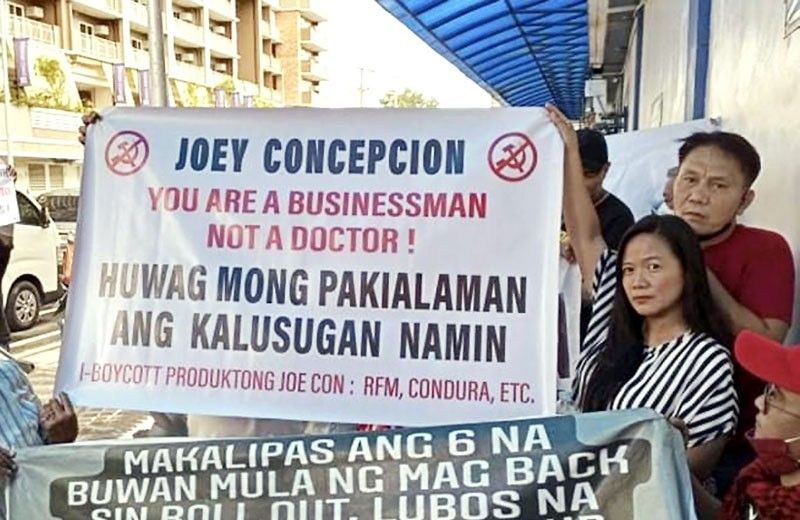The last mile: anti-vaxxers


As presidential adviser on entrepreneurship, I took on the cudgels for the MSMEs and advocated for a policy that would make it easier for our millions of small entrepreneurs–who make up 99.5 percent of businesses in the Philippines–gain access to money, markets, and mentorship.
When the pandemic broke out, I found myself championing the reopening of businesses. But I soon realized that in order to return our businesses to normal operations, we needed to vaccinate as many Filipinos as we could. And so my role expanded; I was thrust into the company of experts on epidemiology, data science, public health, and vaccine logistics and development. Through it all, one thing became crystal clear: vaccines work, and they will hasten our return to normal.
I had my share of differences of opinion when it came to strategies to open up the economy. At some point, I had to push for a lockdown so we could have a safe reopening in the fourth quarter, to the dismay of those who insisted otherwise.
Luckily, I have had very little opposition to vaccinations. I think Filipinos have a high level of empathy for their neighbors. And they have more common sense than most.
Anti-vaxxers remain a fringe movement in the Philippines. One just has to look around. You will not find Filipino bus drivers or truck drivers parking their rigs or buses at busy intersections just to protest vaccine mandates. Only a handful – not thousands – show up at rallies to oppose vaccinations. And if you make known your conspiracy theories, you might be laughed out of the carinderia for basing your health decisions on a YouTube video or on hearsay about this friend of a neighbor’s cousin’s sister-in-law’s highschool classmate suffering a blood clot after getting a COVID shot.
Of course, there will be grumbling. Like the comments that followed my statement about booster shots, which I have since made clear should eventually be necessary in places where primary vaccinations are already high, such as the NCR.
People will voice out their opinion, government then listens, and a decision is made, and not always to the applause of the public. Some decisions are difficult, and I have come to respect how the IATF held their ground on certain decisions.
I have been on the receiving end of people disagreeing with me and I accept that it comes with the territory. I have received reports, for example, that some anti-vaxxers visited our offices at RFM last week to make their opinions known. It took some effort as there was hardly any mention of it in the news, but we managed to find some photos on their social media page.
As I read their manifesto, it became clear that we have some way to go to convince them to get their shots. So many of their concerns have already been addressed ad nauseam, but we must reach out to them and explain things further.
But why bother, you say? Why not just let these people either: (a) get infected and acquire immunity anyway, or (b) get infected and end up in the ICU? Aside from trying to be good human beings and steering people away from danger, there is another compelling reason for us in the private sector.
Business should be concerned about the fringe because they threaten to pull up key indicators, such as healthcare utilization and deaths. In the US, the daily average number of deaths from the Omicron variant has surpassed the Delta deaths. Although Omicron is less severe, this is true only for those who have already acquired immunity; COVID remains deadly for the unvaccinated and those with co-morbidities. And because it spreads so quickly, it pulls up the number of cases and with it, the probability that more people are going to die from infection.
Once our indicators in the Philippines cross into the red line again, we endanger losing what so many of us in the majority have worked hard for, and then back we go into lockdowns.
There is so much good news already. As of Feb. 21, our positivity rates are below the WHO thresholds for reopening, and our hospital capacity in the NCR and Calabarzon are still okay.
In manufacturing and retail, the vaccine holdouts are what we call the last mile. I can tell you that the last mile is often the most difficult in this business. Your factory manufactured the finished product, you’ve shipped it to a grocery in the provinces, and the merchandisers put it on a shelf. Then you cross your fingers that a shopper picks it up and is satisfied with the product.
The vaccines were developed (in record time, I might add), procured by government and the private sector, shipped to vaccination centers where health professionals are ready to administer them.
Geographical challenges can be met, and I am confident that government can reach the farthest sitio and vaccinate its residents. The toughest hurdle exists in the mind. Let us just hope that those who still refuse to take the vaccines are among the lucky ones who have acquired natural immunity and will not threaten to clog up the hospitals or become petri dishes for new variants. Beyond that, we must do what we can to convince them to take the vaccines, and finally complete that last mile.
- Latest
- Trending

























